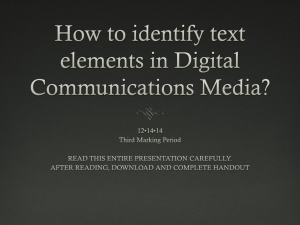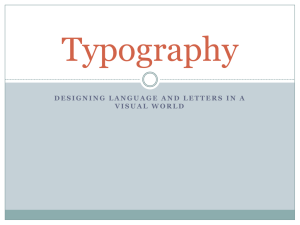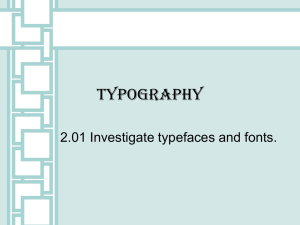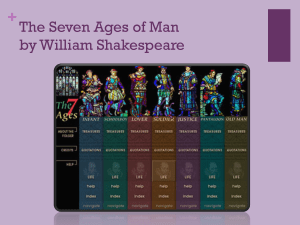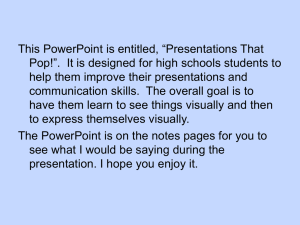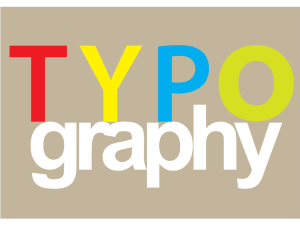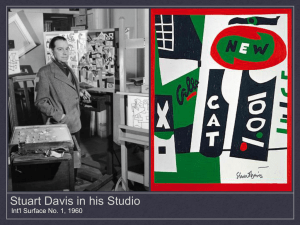Lecture on Intro to Typography - Slides
advertisement
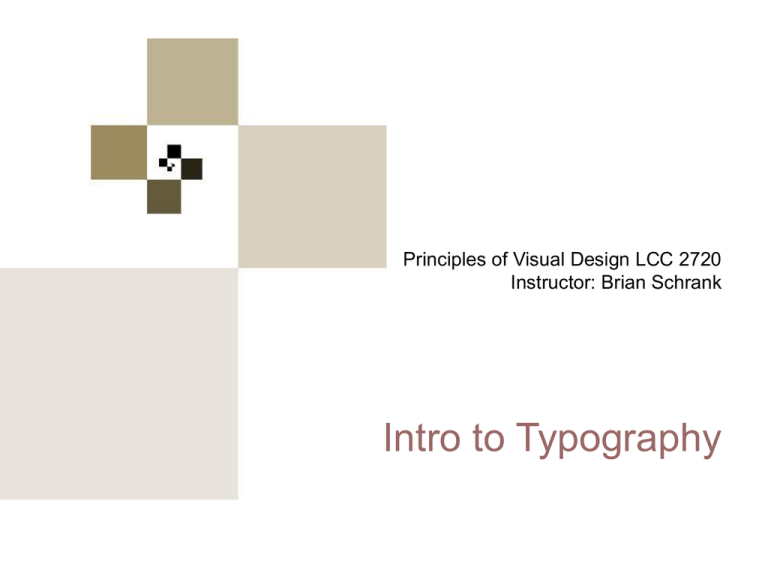
Principles of Visual Design 2720 Principles of Visual Design LCC 2720 Instructor: Brian Schrank Intro to Typography Principles of Visual Design 2720 Typography is the design of arranging text and modifying letters (type glyphs). Principles of Visual Design 2720 Which is a better use of typography and why? Principles of Visual Design 2720 Typography is the visual design of text. Principles of Visual Design 2720 Text-heavy typography… Principles of Visual Design 2720 The Basic Principle Typography establishes a hierarchy of meaning. The reader easily looks around without getting lost or distracted. Typography is visual leadership. Principles of Visual Design 2720 Image-heavy typography… Principles of Visual Design 2720 The Basic Principle When typography is used in graphic design… the visual aspects of text become another way meaning is conveyed. Principles of Visual Design 2720 “Concrete Poetry” uses Typography Principles of Visual Design 2720 “Concrete Poetry” uses Typography Principles of Visual Design 2720 Early 20th century avant-garde art influenced a century of experiments and inventions graphic design and typography. Principles of Visual Design 2720 Futurism A typographic poem from 1919 evokes explosive machine power and Fascist ideology. Principles of Visual Design 2720 = Constructivism El Lissitski invented principles of geometric order, integration, and simplicity to symbolize Communist ideals via typography. Principles of Visual Design 2720 Dada Poster from 1918 uses anarchy, humor, and idiotic references (notice the chicken) to attack high art. Principles of Visual Design 2720 Logos use typography in obvious ways… Principles of Visual Design 2720 What does the typography of “Fanta” signify? Principles of Visual Design 2720 Logos use typography in subtle ways… Principles of Visual Design 2720 What IMAGE is subliminally present in the typography of this logo? Principles of Visual Design 2720 What IMAGE is subliminally present in the typography of this logo? Principles of Visual Design 2720 Principles of Visual Design 2720 Typefaces and Fonts Principles of Visual Design 2720 Gill Sans is a Typeface Gill Sans Gill Sans Bold Gill Sans Book Gill Sans Book Italic Gill Sans Extra Bold Gill Sans Condensed Bold Gill Sans Shadow Principles of Visual Design 2720 Gill Sans is a Typeface Gill Sans Gill Sans Bold Each typeface has a “family” of fonts Gill Sans Book Gill Sans Book Italic Gill Sans Extra Bold Gill Sans Condensed Bold Gill Sans Shadow Principles of Visual Design 2720 You should be able to name at least 5 typefaces and understand when and how to use them. Principles of Visual Design 2720 Gill Sans Typeface Eric Gill invented the typeface in 1928. It was one of the first “successful” sans serif typeface. It is admired for its gracefulness and versatility. Principles of Visual Design 2720 Gill Sans in Logos Principles of Visual Design 2720 Gill Sans in Logos Principles of Visual Design 2720 Principles of Visual Design 2720 History of Typefaces Principles of Visual Design 2720 History of Typefaces Principles of Visual Design 2720 History of Typefaces Principles of Visual Design 2720 Typefaces are NOT interchangeable Principles of Visual Design 2720 Each typeface is pre-loaded with cultural meaning: Principles of Visual Design 2720 Principles of Visual Design 2720 Principles of Visual Design 2720 Serif / Sans Serif Principles of Visual Design 2720 The Serif Small decorative strokes added to the end of a letter's main strokes. Principles of Visual Design 2720 We visually grasp words as a whole by unconsciously comparing the different letter patterns in our mind. Serifs makes this pattern recognition easier. Principles of Visual Design 2720 Serifs improve readability by leading the eye along the line of type. Serifs are good for body text. Principles of Visual Design 2720 Origins of the Serif A scribe, using a brush, painted the letters onto the stone. A carver then used these painted strokes as a guide. The serif appeared when the scribe stopped the brush and lifted it, leaving a bit of a brush edge on the letter. The carver, not seeing the error, simply chiseled that edge out of the stone as well creating the serif. Principles of Visual Design 2720 Principles of Visual Design 2720 Slab Serifs In the 19th Century typefaces for attracting attention were in demand for business: advertising, posters, flyers, etc. Principles of Visual Design 2720 Sans Serif (Grotesque) Sans Serif (without serifs) reduces letterforms to the essentials. The first sans serif typefaces were issued in 1816 Britain, but were considered unappealing since they lacked the traditional serif and were called Grotesque. Principles of Visual Design 2720 Bauhaus another avant-garde movement, helped popularize Sans Serif in the 1920s. Principles of Visual Design 2720 Kerning Principles of Visual Design 2720 Kerning Kerning is the space between letters. Principles of Visual Design 2720 Which word is better Kerned? Principles of Visual Design 2720 Which word is better Kerned? Principles of Visual Design 2720 Kerning Mathematic Visual Principles of Visual Design 2720 Kerning Mathematic Visual Principles of Visual Design 2720 Questions?
